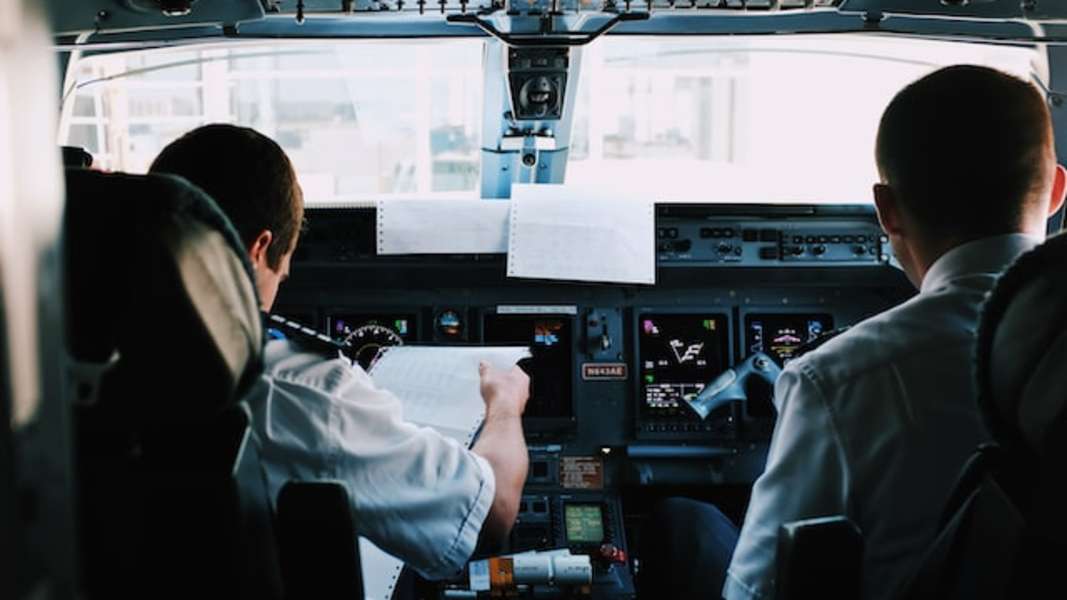What is the COMPASS test for pilots?
The Computerised Pilot Aptitude Screening System, known as the COMPASS test, is an assessment of the key cognitive and psychomotor skills required of a commercial airline pilot.
Developed by EPST (European Pilot Screening and Training), it is widely used across the aviation industry to inform candidate selection, administered by major airlines such as Emirates and British Airways, as well as a number of prominent flight schools.
The test is standardised, meaning all applicants in any given recruitment drive will face the same set of questions and tasks. This allows employers to make objective, well-informed decisions on who to progress to the next stage of selection.
What's included in the COMPASS test for pilots?
As such a diverse set of skills is needed for the pilot profession, the COMPASS test is actually six tests in one, with each section testing certain abilities.
There are also two versions that exist - the standard version for cadet pilot selection and the advanced version used for the recruitment of experienced pilots.
In the standard COMPASS test, the following question types are presented:
Control: a manual on-screen task that measures hand, foot and eye coordination.
Slalom: a measure of hand-to-eye coordination specifically.
Task manager: an exercise in which the test taker must complete two tasks running side by side with speed and accuracy.
Mathematics: a series of questions measuring numerical reasoning and knowledge of mathematical concepts relating to things like speed and distance.
Memory: questions that focus on short-term memory, recall and information ordering.
Tech-test: a technical section of the test that covers physical principles and how to apply them.
Orientation: here candidates are challenged on their spatial reasoning skills and instrument interpretation.
Aviation-English: this section tests knowledge of industry-specific terminology.
Verbal reasoning: a measure of the test takers' ability to evaluate and draw logical conclusions from written information.
In the advanced COMPASS test, candidates will also face a complex control task and a series of questions to measure their professional knowledge.
Before each individual test begins, you'll be given on-screen instructions and the chance to complete a practice question or task. When all six tests are complete, a detailed scoring report will be automatically generated.
What does the COMPASS test for pilots measure?
Questions on the COMPASS test have been expertly designed to measure the skills and abilities deemed essential in the pilot profession. These include:
Psychomotor skills: these are physical skills that use cognitive functions, such as reactive movement and coordination, and are a must-have for anyone charged with flying a plane.
Multitasking: pilots often need to attend to concurrent activities, or switch their focus quickly from one task to another.
Stress tolerance: pilots work under a lot of pressure. They are responsible for passenger safety and often have to deal with challenging circumstances, so a high level of stress tolerance is key.
Spatial orientation: this is a complex skill that involves awareness and interpretation of space, distance, motion and altitude, among other things.
Logic and reasoning: these skills relate to problem-solving and decision-making ability, both critical for pilots who often need to react to changing circumstances.
Communication skills: flight safety relies on the delivery of clear, accurate and timely information, so it is essential that all pilots possess strong communication skills.
Numerical and mathematical skills: a pilot must be skilled in the interpretation and manipulation of numbers, able to draw logical conclusions from data and perform mental calculations at speed.
What are the benefits of taking the COMPASS test for pilots?
If you're preparing to take the COMPASS test for pilots it's likely at the request of a potential employer or a flight school, so it's in your best interests to put in a strong performance.
In employing you, an airline makes a big investment of time and money. It also places its reputation for safety and professionalism largely in your hands.
It is because of this that aviation employers seek applicants of the highest calibre and why such emphasis is placed on your COMPASS test results. A high score will set you apart as a talented candidate worth the investment.
How you can ace the COMPASS test for pilots
Hone your skills
From brain training apps that sharpen your memory and logic to sports that improve coordination, there are plenty of ways to build on both your cognitive and psychomotor skills. Find activities that you enjoy to make test prep feel more like a hobby.
Study
Though no flight experience is necessary for the standard COMPASS test, a level of industry and technical knowledge is. Make a study plan for the aviation English and technical sections of the test to brush up on your knowledge of ATC phraseology and principles of physics.
Take aptitude tests
Verbal, numerical, mechanical and spatial reasoning questions will all appear throughout your COMPASS test, and if you're not familiar with their format they can be quite a challenge. Take plenty of aptitude tests to gain confidence with these question types and improve your ability in each area.
Get plenty of rest beforehand
The COMPASS test for pilots requires you to be alert, reactive and focused. In the days and weeks before your test, establish a healthy routine that ensures you're well rested on the day. This will improve your concentration and help you achieve that all-important high score.







